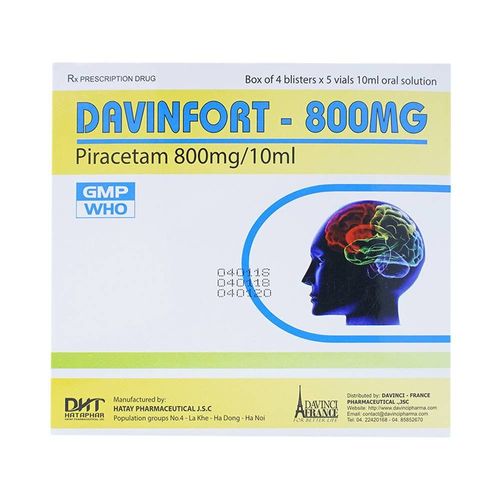This is an automatically translated article.
Article by Doctor Vu Dung Kien - Department of General Internal Medicine - Vinmec Times City International General HospitalRecent research has shown a marked reduction in the prevalence and frequency of dementia, improvements that appear to be related to earlier investments at the population level, such as To better educate the public and improve conditions related to vascular disease, the researchers further emphasize the need for these primary prevention measures.
1. Prevention of Alzheimer's disease
The researchers also note: Although efforts around the world to update and upgrade the evidence related to Alzheimer's disease prevention have accelerated in recent years, the studies have been cautioned by the inconsistent conclusions and different study designs. In addition, the large number of heterogeneous study results make interpretation of the evidence difficult.Professor Yu, Fudan University, Shanghai, China said: “There is increasing evidence that Alzheimer's disease, like other common chronic diseases, can be prevented through improving the quality of life. educational attainment and improved control of modifiable risk factors. However, to date, there are no evidence-based guidelines for preventing the disease."

2. 21 evidence-based recommendations for Alzheimer's prevention
New findings from a large systematic review and meta-analysis reveal 10 major risk factors for Alzheimer's disease (AD). The findings have led to the publication of what researchers call the first evidence-based measures to prevent Alzheimer's disease. The guideline document includes 21 recommendations based primarily on 10 Alzheimer's disease risk factors with type 1, level A evidence. These risk factors include, low cognitive functioning, mass index high body mass index (BMI) at the end of life, depression, diabetes and high blood pressure and other factors."The first evidence-based guideline proposed, provides clinicians and stakeholders with current guidance for the prevention of Alzheimer's disease," said lead author Jin-Tai Yu, MD, PhD, professor neurologist, Fudan University, Shanghai, China, told Medscape Medical News. Yu added: “Nearly two-thirds of these recommendations target vascular and lifestyle risk factors, reinforcing the importance of good vascular control and maintaining a healthy lifestyle to prevent Alzheimer.
For this study, an international team of investigators consolidated existing evidence from prospective observational studies and randomized controlled trials to formulate levels of evidence and suggestive categories. clinical trials for the prevention of Alzheimer's disease
Researchers searched the PubMed, EMBASE, and CENTRAL databases from inception through March 2019 to find relevant prospective observational studies and trials for Alzheimer's disease. random evidence.
Multivariable adjusted risk estimates were obtained for each study. This process involves three independent steps - data extraction by three pairs of experienced investigators, independent data checking by 10 researchers, and consensus/analysis to resolve discrepancies. The quality of eligible studies was assessed using assessment tools. Reliability of the evidence is graded A, B, or C. Recommendations are classified I (strong recommendation), class II (weak recommendation), or class III (not recommended). ).
There were 33,145 observational prospective study records and 11,531 randomized controlled trial records selected. After exclusion criteria were applied, 243 prospective observational studies and 153 completed randomized controlled trials were included in the final analysis. From these studies, the researchers included in the meta-analysis 104 modifiable risk factors and 11 interventions.
Study results provide 21 evidence-based recommendations for the prevention of Alzheimer's disease. These risk factors have varying degrees of reliable evidence, with 11 risk factors class A and 10 risk factors B. They also make recommendations of different strength. with 19 Class I recommendations and 2 Class III recommendations.
19 elements with type I recommendations include:
2.1. 10 Evidence-Based Factors Level A Cognitive performance Increased blood homocysteinemia (cardiovascular biomarker) Increased BMI in the elderly Depression Stress Diabetes Head trauma Middle-aged hypertension Hypoglycemia Education stance

Estrogen replacement therapy (Grade A) Acetylcholinesterase inhibitors (Grade B). Six factors were assessed as having weak evidence (grade C) that needed further study.
Control of diastolic blood pressure Use of non-steroidal anti-inflammatory drugs (NSAIDs) Social activity Osteoporosis Pesticide exposure Silicon contamination from drinking water. Several findings from the meta-analysis have challenged conventional understanding of the etiology of Alzheimer's disease. Yu noted.
Although it is believed that the incidence of Alzheimer's disease is higher in postmenopausal women, "our study shows that estrogen replacement therapy does not reduce the risk of Alzheimer's disease," says Yu. "Instead, a long course of treatment, especially those lasting more than 10 years, can exacerbate the progression of Alzheimer's disease," he added.
It has been suggested that acetylcholinesterase inhibitors (ACIs) may help prevent Alzheimer's disease. While these agents may be effective in treating Alzheimer's symptoms, new meta-analyses show they do not reduce the risk of Alzheimer's disease, Yu also noted. “Therefore, neither estrogen replacement therapy nor ACI has been suggested to prevent Alzheimer's disease,” he said.
Yu notes that their study is the largest, most comprehensive systematic review and meta-analysis of Alzheimer's disease to date. The investigators therefore believe that these evidence-based suggestions may help prevent the disease.
Education, regular exercise, maintaining a healthy BMI, getting enough vitamin C, not smoking and getting enough sleep from a young age will help prevent many of the main Alzheimer's risk factors, including diabetes diabetes, cerebrovascular disease, hypertension, depression and stress, through a healthier lifestyle, maintaining a healthy lifestyle in later life is equally important. Yu said.

Commenting on the new findings of the study to Medscape Medical News, Yi Tang, MD, PhD, professor of neurology at Capital Medical University, Beijing, China, says the study is particularly helpful due to the current There is a lack of disease-modifying measures that have been validated to slow or stop the progression of dementia. "It is therefore particularly important to prevent dementia guided by a deeper understanding of risk factors," said Tang, who was not involved in the study. He added: The 21 evidence-based recommendations in the current meta-analysis could "provide clinicians with firmer guidelines for the prevention of Alzheimer's disease". With these evidence-based recommendations, clinicians can provide a comprehensive overview of Alzheimer's prevention strategies in people with a family history of dementia or at risk. cognitive decline. prospective randomized controlled clinical trials, he noted.

Vinmec International General Hospital with a system of modern facilities, medical equipment and a team of experts and doctors with many years of experience in medical examination and treatment, patients can rest assured to visit. Alzheimer's disease examination and treatment at the Hospital.
Please dial HOTLINE for more information or register for an appointment HERE. Download MyVinmec app to make appointments faster and to manage your bookings easily.
Reference source: medscape.comMORE
Identifying Alzheimer's disease by physical manifestations Dementia in the elderly: What you need to know Diagnosis and treatment of dementia in the elderly














